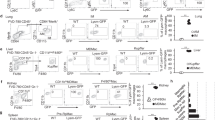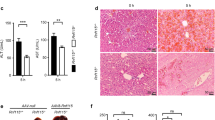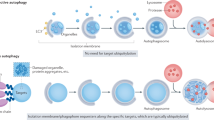Abstract
Autophagy is a lysosomal pathway for cellular homeostasis control. Both non-selective bulk autophagy and selective autophagy of specific proteins or organelles have been found. Selective autophagy prevents cells from pathogen invasion and stress damage, but its role in regulating transcriptional factors is not clear. Using a macrophage cell differentiation model, the role of autophagy in nuclear factor-κB (NF-κB) regulation is investigated. The bone marrow-derived macrophages (BMDMs) will differentiate into a M2-like phenotype in the presence of hepatoma tumor cell condition medium (CM). The TLR2 signaling drives this M2 polarization and causes NF-κB p65 degradation via lysosome-dependent pathway. The CM-induced ubiquitinated- NF-κB p65 forms aggresome-like structures (ALS) in the cytoplasm of cultured and hepatoma-associated M2 macrophages. This NF-κB p65-contained ALS is recognized by p62/SQSTM1 and degraded by selective autophagy. Treatment with the lysosomal inhibitor bafilomycin A1 or the knockdown of Atg5 can prevent CM-induced NK-κB p65 degradation and induce M2 macrophages to produce a high level of pro-inflammatory cytokines. Furthermore, TLR2 signal induces sustained phosphorylation of extracellular signal-regulated kinase 1/2 to facilitate this autophagy-dependent NF-κB regulation. Our finding provides a novel pathway of NF-κB regulation by p62/SQSTM1-mediated selective autophagy.
Similar content being viewed by others
Log in or create a free account to read this content
Gain free access to this article, as well as selected content from this journal and more on nature.com
or
Abbreviations
- NF-κB:
-
nuclear factor-κB
- p62/SQSTM1:
-
p62/sequestosome-1
- TAM:
-
tumor-associated macrophage
- ERK1/2:
-
extracellular signal-regulated kinase 1/2
References
Mizushima N, Levine B, Cuervo AM, Klionsky DJ . Autophagy fights disease through cellular self-digestion. Nature 2008; 451: 1069–1075.
Wang RC, Levine B . Autophagy in cellular growth control. FEBS Lett 2010; 584: 1417–1426.
Kraft C, Peter M, Hofmann K . Selective autophagy: ubiquitin-mediated recognition and beyond. Nat Cell Biol 2010; 12: 836–841.
Komatsu M, Ichimura Y . Selective autophagy regulates various cellular functions. Genes Cells 2010; 15: 923–933.
Komatsu M, Ichimura Y . Physiological significance of selective degradation of p62 by autophagy. FEBS Lett 2010; 584: 1374–1378.
Lee JY, Koga H, Kawaguchi Y, Tang W, Wong E, Gao YS et al. HDAC6 controls autophagosome maturation essential for ubiquitin-selective quality-control autophagy. EMBO J 2010; 29: 969–980.
Kirkin V, Lamark T, Sou YS, Bjorkoy G, Nunn JL, Bruun JA et al. A role for NBR1 in autophagosomal degradation of ubiquitinated substrates. Mol Cell 2009; 33: 505–516.
Thurston TL, Ryzhakov G, Bloor S, von Muhlinen N, Randow F . The TBK1 adaptor and autophagy receptor NDP52 restricts the proliferation of ubiquitin-coated bacteria. Nat Immunol 2009; 10: 1215–1221.
Wild P, Farhan H, McEwan DG, Wagner S, Rogov VV, Brady NR et al. Phosphorylation of the autophagy receptor optineurin restricts Salmonella growth. Science 2011; 333: 228–233.
Biswas SK, Lewis CE . NF-kappaB as a central regulator of macrophage function in tumors. J Leukoc Biol 2010; 88: 877–884.
Mancino A, Lawrence T . Nuclear factor-kappaB and tumor-associated macrophages. Clin Cancer Res 2010; 16: 784–789.
Verstrepen L, Bekaert T, Chau TL, Tavernier J, Chariot A, Beyaert R . TLR-4, IL-1R and TNF-R signaling to NF-kappaB: variations on a common theme. Cell Mol Life Sci 2008; 65: 2964–2978.
Maine GN, Mao X, Komarck CM, Burstein E . COMMD1 promotes the ubiquitination of NF-kappaB subunits through a cullin-containing ubiquitin ligase. EMBO J 2007; 26: 436–447.
Tanaka T, Grusby MJ, Kaisho T . PDLIM2-mediated termination of transcription factor NF-kappaB activation by intranuclear sequestration and degradation of the p65 subunit. Nat Immunol 2007; 8: 584–591.
Arenzana-Seisdedos F, Thompson J, Rodriguez MS, Bachelerie F, Thomas D, Hay RT . Inducible nuclear expression of newly synthesized I kappa B alpha negatively regulates DNA-binding and transcriptional activities of NF-kappa B. Mol Cell Biol 1995; 15: 2689–2696.
Bortoluci KR, Medzhitov R . Control of infection by pyroptosis and autophagy: role of TLR and NLR. Cell Mol Life Sci 2010; 67: 1643–1651.
Kim S, Takahashi H, Lin WW, Descargues P, Grivennikov S, Kim Y et al. Carcinoma-produced factors activate myeloid cells through TLR2 to stimulate metastasis. Nature 2009; 457: 102–106.
Mantovani A, Sica A . Macrophages, innate immunity and cancer: balance, tolerance, and diversity. Curr Opin Immunol 2010; 22: 231–237.
Sica A, Larghi P, Mancino A, Rubino L, Porta C, Totaro MG et al. Macrophage polarization in tumour progression. Sem Cancer Biol 2008; 18: 349–355.
Chang CP, Yang MC, Liu HS, Lin YS, Lei HY . Concanavalin A induces autophagy in hepatoma cells and has a therapeutic effect in a murine in situ hepatoma model. Hepatology 2007; 45: 286–296.
Agrawal S, Agrawal A, Doughty B, Gerwitz A, Blenis J, Van Dyke T et al. Cutting edge: different Toll-like receptor agonists instruct dendritic cells to induce distinct Th responses via differential modulation of extracellular signal-regulated kinase-mitogen-activated protein kinase and c-Fos. J Immunol 2003; 171: 4984–4989.
Ichimura Y, Komatsu M . Selective degradation of p62 by autophagy. Semin Immunopathol 2010; 32: 431–436.
Kirkin V, McEwan DG, Novak I, Dikic I . A role for ubiquitin in selective autophagy. Mol Cell 2009; 34: 259–269.
Gao C, Cao W, Bao L, Zuo W, Xie G, Cai T et al. Autophagy negatively regulates Wnt signalling by promoting Dishevelled degradation. Nat Cell Biol 2010; 12: 781–790.
Duran A, Linares JF, Galvez AS, Wikenheiser K, Flores JM, Diaz-Meco MT et al. The signaling adaptor p62 is an important NF-kappaB mediator in tumorigenesis. Cancer Cell 2008; 13: 343–354.
Corcelle E, Nebout M, Bekri S, Gauthier N, Hofman P, Poujeol P et al. Disruption of autophagy at the maturation step by the carcinogen lindane is associated with the sustained mitogen-activated protein kinase/extracellular signal-regulated kinase activity. Cancer Res 2006; 66: 6861–6870.
Takeda K, Akira S . TLR signaling pathways. Semin Immunol 2004; 16: 3–9.
Nakahira K, Haspel JA, Rathinam VA, Lee SJ, Dolinay T, Lam HC et al. Autophagy proteins regulate innate immune responses by inhibiting the release of mitochondrial DNA mediated by the NALP3 inflammasome. Nat Immunol 2011; 12: 222–230.
Harris J, Hartman M, Roche C, Zeng SG, O'Shea A, Sharp FA et al. Autophagy Controls IL-1{beta} Secretion by Targeting Pro-IL-1{beta} for Degradation. J Biol Chem 2011; 286: 9587–9597.
Mantovani A, Sozzani S, Locati M, Allavena P, Sica A . Macrophage polarization: tumor-associated macrophages as a paradigm for polarized M2 mononuclear phagocytes. Trends Immunol 2002; 23: 549–555.
Acknowledgements
We thank Dr. Kuo-Feng Hua for kindly providing RAW-Blue cells. This work was supported by grant NSC-98-2320-B-006-031-MY2 from the National Science Council, Taiwan, ROC and program from Center of Infectious Disease and Signaling Research, National Cheng Kung University.
Author contributions
In memoriam: Dr. Huan-Yao Lei (1955-2012), a leader, educator and immunologist, has made important contributions to this work.
Author information
Authors and Affiliations
Corresponding author
Ethics declarations
Competing interests
The authors declare no conflict of interest.
Additional information
Edited by H-U Simon.
Supplementary Information accompanies the paper on Cell Death and Differentiation website
Supplementary information
Rights and permissions
About this article
Cite this article
Chang, CP., Su, YC., Hu, CW. et al. TLR2-dependent selective autophagy regulates NF-κB lysosomal degradation in hepatoma-derived M2 macrophage differentiation. Cell Death Differ 20, 515–523 (2013). https://doi.org/10.1038/cdd.2012.146
Received:
Revised:
Accepted:
Published:
Issue date:
DOI: https://doi.org/10.1038/cdd.2012.146
Keywords
This article is cited by
-
The Streptococcus virulence protein PepO triggers anti-tumor immune responses by reprograming tumor-associated macrophages in a mouse triple negative breast cancer model
Cell & Bioscience (2023)
-
Tumor cell-derived conditioned medium induced pro-tumoral phenotypes in macrophages through calcium-nuclear factor κB interaction
BMC Cancer (2022)
-
The role of dendritic cells in the immunomodulation to implanted biomaterials
International Journal of Oral Science (2022)
-
Role of lysosomes in physiological activities, diseases, and therapy
Journal of Hematology & Oncology (2021)
-
Lymphangiogenesis in renal fibrosis arises from macrophages via VEGF-C/VEGFR3-dependent autophagy and polarization
Cell Death & Disease (2021)



